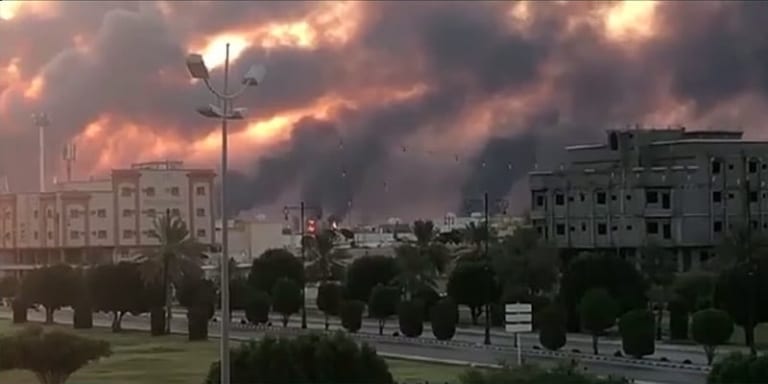
On Saturday, September 14, unmanned aerial vehicles attacked two large oil installations in Saudi Arabia, setting them ablaze and disrupting the kingdom’s exports to the international market. The attacks were originally thought to be the work of Yemen’s Houthi rebels, but American officials, primarily Secretary of State Mike Pompeo, said that Yemen could not have been the source of the drones and accused Iran of being behind the operation. President Donald Trump stated that the United States is ready for military action. From its side, and careful not to put full blame on Iran, Saudi Arabia announced that Iranian weapons were used in the attacks but discounted the theory that they originated in Yemen.
Whatever the origin of the drones and identity of the perpetrators, these attacks should be seen as a game changer in Saudi domestic politics and in regional and international affairs. Saudi Arabia is the largest oil producer in the world and disrupting its oil supplies is a direct hit on its own economy, the regional economic and political conditions, and the fate of global prosperity and wellbeing. The Kingdom is also the proverbial fulcrum of Arab politics, involved as it is in holding fast on preserving the Arab status quo, leading a coalition fighting a war in Yemen, affecting strategic developments in the Arabian Gulf and the Red Sea, and providing financial wherewithal to a number of Arab states, among other things. Its stability and the health of its economy that has just experienced what cannot be but a strategic takedown are today in danger, and with them a regional and international community already beset by myriad other problems.
Arab Center Washington DC (ACW) asked its research fellows to comment on the strikes and their repercussions on Saudi Arabia, the region, and the international community. Their views are below.
Will Saudi Arabia now begin to re-think its intervention in Yemen?
Khalil E. Jahshan, Executive Director, ACW
The war in Yemen and its spillover across the border into Saudi Arabian territory is not new. However, the unprecedented strikes claimed by the Houthis against the oil facilities in Abqaiq and Khurais in Saudi Arabia are clearly a game changer in terms of their strategic target, accuracy, and global impact. Targeting the Abqaiq oil complex, in particular, is a very sophisticated act that requires advanced technological skills uncharacteristic of previous attacks on Saudi civilian or industrial targets over the past four years. Experts have been quick to point out that the technical skills and equipment most likely involved in this attack are not readily available to Houthis or other parties in Yemen.
The Abqaiq attacks represent a series of serious challenges to the Saudi government, and specifically to its defense establishment. The first of these challenges pertains to the identity of the perpetrators. Should there be undisputable evidence that other parties in Iran or Iraq, as implied by some in the United States, had a hand in planning or executing this attack, the Saudis would have to adjust to the globalization of its war on Yemen. Such findings are apt to change the conduct, rationale, and consequences of that war. But what would be left for Saudi leaders to do is find the proper way to extricate themselves from there with their credibility intact.
Second, the raids on Saudi oil facilities raise serious questions about the reliability of Saudi defenses against its enemies, both domestic and foreign. As the largest buyer of weapons in the world, the Kingdom has to account for the vulnerability of its vital oil facilities despite spending hundreds of billions of dollars on armaments, particularly from the United States. With $67.6 billion in military spending in 2018, i.e., 8.8 percent of the Kingdom’s GDP, one would expect vital Saudi oil facilities to be more secure than Abqaiq and Khurais are, particularly against primitive weapons systems like drones.
Third, this attack has led to the most significant disruption of the flow of oil from Saudi Arabia in decades. Recovery is expected to be much harder and slower than anticipated by restless politicians. Experts familiar with the equipment installed at Abqaiq anticipate long months, if not years, needed to replace the damage and restore operability to the sophisticated facility. The economic and national security magnitude of this disruption is going to have a long-term impact on both Saudi and global markets, including serious implications for domestic Saudi economic and political concerns. The impact of this crisis on Saudi economic plans, including the impending Aramco public stock offering and Saudi Vision 2030 remain to be seen.
How will other GCC states look at this development?
Kristian Coates Ulrichsen, Non-Resident fellow, ACW
Leaders in all Gulf states will be watching the American response very closely for any sign of a policy change from the longstanding premise that the United States would come to their defense in the event of an external attack. That the attack on the Saudi oil installations is an external attack––even if the point of origin and the identity of the perpetrator remains unclear––is taken as a given; however, the recent series of attacks on energy infrastructures and shipping in the region has concentrated minds on the risks and costs of a conflict in the Gulf. There is unlikely to be any real enthusiasm in Gulf capitals for US military strikes against the Islamic Republic, so attention will focus instead on what sort of response the United States decides to follow. At the same time, the ongoing rift within the Gulf Cooperation Council (GCC) continues to undermine the ability of the Gulf states to present a unified front against external aggressors.
Policymakers in Gulf capitals and within the American government who wish to see an end to the 27-month GCC rift may seize the opportunity at meetings this week in Washington of the Middle East Strategic Alliance (MESA) to redouble their efforts to find a resolution to the crisis. The GCC rift was due to have been discussed at a meeting between the Emir of Kuwait Sheikh Sabah al-Ahmad al-Jaber al-Sabah and President Donald Trump on September 12, which was postponed, and now appears more important than ever. In the past, the Gulf states have moved closer together in the face of external pressure, and it will be instructive to see if this holds true on this occasion, or whether the determination of the leadership in the United Arab Emirates to maintain its political campaign against fellow US regional partner Qatar will override other considerations.
What can the regional repercussions be?
Abdelwahab al-Qassab, Visiting Fellow, ACW
The first repercussion of these attacks is the collapse of the theory of Saudi security in both of its elements, purchases of advanced and heavy arms and American guarantees of such security. This will transcend Saudi Arabia to the UAE with which there has developed a rift following the latter’s announced withdrawal from Yemen. The UAE is likely to begin a separate dialogue with Iran whose Houthi allies have refrained from striking it, possibly following Iranian pressure not to do so.
On the other hand, the fissure in the GCC is likely to widen as Oman and Kuwait continue to distance themselves from a confrontational stance with Iran. Kuwait received Iran’s Foreign Minister Mohammed Javad Zarif recently. But Bahrain may become ripe for collapse soon. In other words, we may be looking at a Saudi retreat, akin to completely losing a war, as Iran becomes more sure of itself and increases its influence in Yemen, Syria, Iraq, and perhaps other areas. Subsequently, Russia may increase the number of cards it holds as Iran’s undeclared ally in the region and specifically in Syria.
Additionally, there may not be any impact from US Secretary of State Mike Pompeo’s threats and announcements following the non-response to Iran’s downing of a US drone last June. With such an uncommitted American position to the security of the GCC states such as the UAE, Kuwait, and Bahrain, it is better that they stay away from any alignments that will harm them in the end. Finally, it would not be too strange if Iran’s successes here and there force the resignation of Iraq’s Prime Minister Adel Abdel-Mahdi, who has not been fully observant of Iranian interests, and the anointment of Hadi al-Amery, a militia leader friendly to Iran, as a new prime minister for the country.
Does the United States benefit from what happened?
Joe Macaron, Resident Fellow, ACW
This unprecedented attack on Saudi oil infrastructure tests both US-Saudi relations and the White House’s commitment to deter Iran militarily. In his own cost/benefit calculations, Trump sees no stake in getting dragged into a war with Iran on behalf of Saudi Arabia as the United States no longer relies on Middle East oil, which now primarily benefits the Asian markets. These attacks on Aramco also put pressure on the Chinese economy, which might serve Trump’s end goal in his trade war with Beijing.
The hardliners in Tehran have been pushing the envelope in their regional attacks and Trump’s only red line so far seems to be American human casualties. The White House seems fine if Saudi Arabia pays the price of the American “maximum pressure” approach against Tehran. Moreover, Trump appears to be throwing the ball in the Saudi court on whether a retaliation against the Iranian regime is required. This does not mean the White House is deferring to Riyadh on a war and peace decision but rather shows that Washington wants Riyadh to take the lead on this rather than the other way around, while the Saudi leadership is on the defensive expecting Trump to set the tone. The hardliners in Tehran are also wary of potential US-Iranian talks after the firing of White House National Security Adviser John Bolton, hence the meeting between Trump and his Iranian counterpart Hassan Rouhani in New York later this month might be more difficult to arrange.
Moreover, Israel has recently been targeting Iranian proxies while Tehran hits back against US proxies in the Gulf; however, both the US and Iran remain not invested in starting a direct war. The White House has exhausted all options of diplomatic and economic pressure against the Iranian regime, hence there is nothing more that can be done short of a US military attack and Trump should make this determination as the US economy faces a looming inflation in the midst of an American presidential election cycle. When the dust settles, it is hard to imagine how the relation between Trump and the Saudi leadership can remain strong after this attack.
What can the international reaction be?
Imad K. Harb, Director of Research, ACW
Saudi oil exports are central to the supply of hydrocarbons for the international economy, forming anywhere between 10 and 12 percent of daily supply. Most Saudi supplies go to the eastern economic powerhouses of Japan, South Korea, China, and India, while much of the derivatives of oil production enter in manufacturing, fertilizers, textiles, and other industries around the world. All these will suffer from the higher oil prices precipitated by the attacks. With the Saudi oil economy getting a powerful blow that prevents it from exploiting the higher prices, it is likely that Saudi investments in different sectors of the international economy––including in financial instruments essential for advanced western economies––will shrink, causing slowdowns, higher budget deficits, and lower growth everywhere. Although these consequences are likely to be delayed for the time being, their multiplier effects will slowly seep into local and international economies. These effects include trade, military sales, development projects, loans and grants, bank transfers, as well as other elements of the globalized economy.
In addition to the effect of higher oil prices, smaller Saudi budgets and investments, and a slowdown in the global economy, there is the difficult distinct possibility that the kingdom will limit the number of expatriates entering its job market. As its economy slows down, others in the neighborhood will follow suit. With both the public and private sectors in the kingdom and the region relying on government largesse that is going to shrink as a result of less oil production and limited capacity, both sectors are inevitably going to also terminate employment to hundreds of thousands, if not millions, of expatriates. This will have a devastating impact, especially on less developed economies relying on foreign remittances. Such countries as India, Pakistan, Bangladesh, the Philippines, Yemen, Egypt, and a host of others are likely to experience an influx of repatriated workers for whom there might not be employment or sources of income, possibly precipitating social unrest and political turmoil.
Some may say that this is a doomsday scenario that may not come to pass, but the international community should be aware that the above, and many other calamities not mentioned here, are distinct possibilities. To be sure, these possibilities are not mere slippery slope predictions, precisely because Saudi Arabia is involved. Indeed, the attacks on Saudi Arabia’s oil installations may have been a mere military operation in response to the war on Yemen, or to hit the kingdom where it hurts. But the international community would do well to remember that economic warfare cannot be limited in today’s global economy but can be more devastating to everyone’s peace and prosperity the world over.





